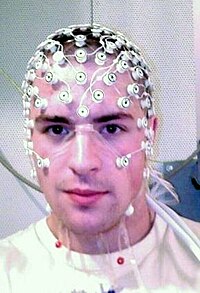
Photo from wikipedia
This study used heart rate variability (HRV) to monitor levels of cancer-related fatigue (CRF) and quality of life (QOL) of cancer survivors subjected to program measures at different psychosomatic or… Click to show full abstract
This study used heart rate variability (HRV) to monitor levels of cancer-related fatigue (CRF) and quality of life (QOL) of cancer survivors subjected to program measures at different psychosomatic or functional levels. A longitudinal study was conducted at a cancer center in Taiwan. Fifty-two cancer survivals were randomly assigned to either the mindfulness group (n = 25) or the Qigong group (n = 27). Both groups received a 12-week mindfulness and Qigong programs, respectively. Improvements in CRF, QOL, and HRV after a 12-week program and at the 3-month follow-up point. For the long-term effects in both mindfulness and Qigong groups, CRF showed a significant downward trend (p < 0.05), but a significant upward trend was observed in HRV (p < 0.001). Mindfulness and Qigong exhibited different effectiveness in individuals, indicating that the mental and physical aspects of health are equally essential and should be addressed in a complementary combination. These findings are worthy of being shared with cancer survivors to benefit their physical and mental well-being. We suggest that healthcare professionals incorporate mindfulness and Qigong in cancer survivors’ daily life as means to encourage lifestyle changes for improving their health.
Journal Title: Journal of Cancer Education
Year Published: 2019
Link to full text (if available)
Share on Social Media: Sign Up to like & get
recommendations!